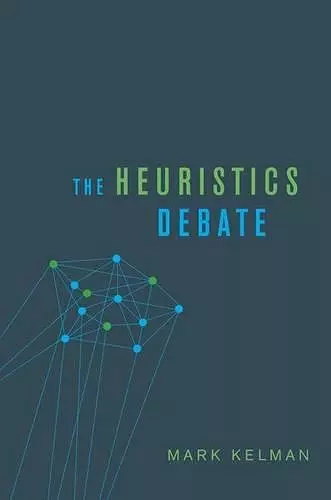The Heuristics Debate
Explores heuristics' impact on law, policymaking, and decision-making processes.
Format:Hardback
Publisher:Oxford University Press Inc
Published:12th May '11
Currently unavailable, and unfortunately no date known when it will be back

This work explores the application of heuristics in law and policymaking, examining how human reasoning impacts decision-making and public policy, ultimately offering insights for students and scholars across various fields.
In The Heuristics Debate, Mark Kelman explores the application of heuristics beyond the realm of economics, particularly in law and policymaking. Heuristics are cognitive shortcuts that people use to make decisions based on limited information, allowing them to reach conclusions without thoroughly analyzing all available data. For example, when someone estimates they walked a mile, they may not know the exact distance, but the term conveys a general sense of the journey. This concept is pervasive across various aspects of life, influencing both everyday decisions and significant economic and political choices.
The book delves into the contrasting perspectives on heuristics, highlighting the 'heuristics and biases' school, which argues that reliance on these shortcuts often leads to suboptimal outcomes due to insufficient information and flawed assumptions. Conversely, the 'fast and frugal' school posits that while errors may occur, the advantages of quick decision-making often outweigh the drawbacks, preventing paralysis by over-analysis. Kelman navigates these debates, emphasizing the potential benefits of a broader understanding of heuristics in public and private sectors.
Ultimately, Kelman presents a compelling argument for recognizing heuristics as a valuable tool for enhancing decision-making processes in law and policy. By examining how people process information, he suggests that we can improve consumer disclosures, legal compliance, and risk regulation. The Heuristics Debate is a significant contribution to the fields of law, business, and public policy, appealing to scholars and students interested in the interplay between human psychology and public governance.
"With characteristic brilliance, Mark Kelman canvasses the psychological literature on heuristic decision making and explores its implications for law and policy. This book won't end the 'heuristics debate,' but it will situate that debate in a fresh and more revealing light."--Douglas A. Kysar, Professor of Law, Yale Las School, and author of Regulating from Nowhere: Environmental Law and the Search for Objectivity "Social science evidence of the way heuristic judgments affect individual decision making has been the basis of the most important developments in legal thought in the 21st Century. In this remarkable book, Mark Kelman, one of the legal academy's deepest and sharpest thinkers, incisively reviews, synthesizes, and critiques the major scholarly trends and tells us what they mean for the way we should think about criminal law, the regulation of markets, and jurisprudence. It is a "must read" for anyone who cares about public policy, legal theory, or intellectual history."--Russel Korobkin, Professor of Law, University of California-Los Angeles School of Law "In The Heuristics Debate, a lively scholarly dispute becomes a window into some of the most compelling intellectual developments in philosophy, cognitive science, economics, and law. Mark Kelman is the ideal author for this project--both for his notable contributions to heuristics research and his valuable perspective as a major legal scholar."--Rob MacCoun, Professor of Law and Public Policy and Affiliated Professor of Psychology, University of California-Berkeley
ISBN: 9780199755608
Dimensions: 163mm x 236mm x 31mm
Weight: 576g
336 pages